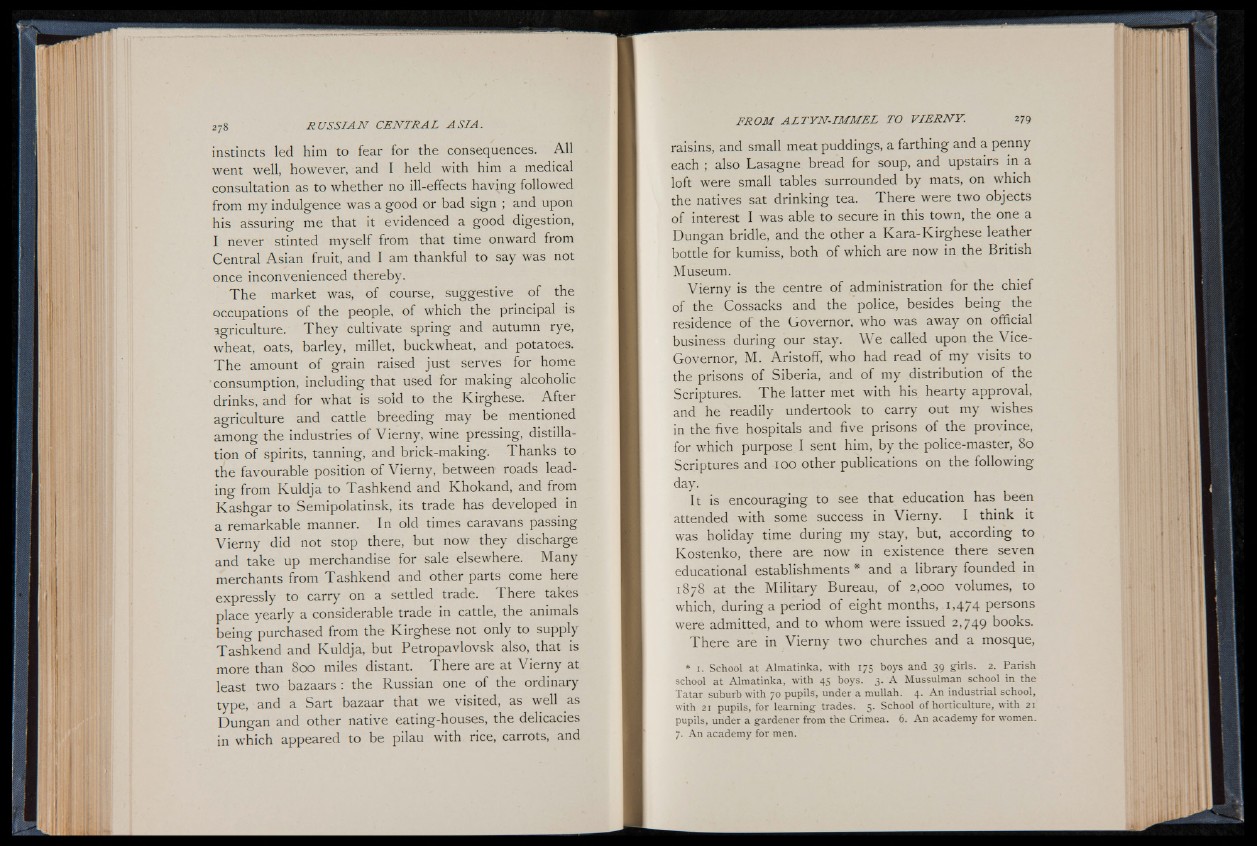
instincts led him to fear for the consequences. All
went well, however, and I held with him a medical
consultation as to whether no ill-effects having followed
from my indulgence was a good or bad sign ; and upon
his assuring me that it evidenced a good digestion,
I never stinted myself from that time onward from
Central Asian fruit, and I am thankful to say was not
once inconvenienced thereby.
The market was, of course, suggestive of the
occupations of the people, of which the principal is
agriculture. They cultivate spring and autumn rye,
wheat, oats, barley, millet, buckwheat, and potatoes.
The amount of grain raised just serves for home
consumption, including that used for making alcoholic
drinks, and for what is sold to the Kirghese. After
agriculture and cattle breeding may be mentioned
among the industries of Vierny, wine pressing, distillation
of spirits, tanning, and brick-making. Thanks to
the favourable position of Vierny, between roads leading
from Kuldja to Tashkend and Khokand, and from
Kashgar to Semipolatinsk, its trade has developed in
a remarkable manner. In old times caravans passing
Vierny did not stop there, but now they discharge
and take up merchandise for sale elsewhere. Many
merchants from Tashkend and other parts come here
expressly to carry on a settled trade. There takes
place yearly a considerable trade in cattle, the animals
being purchased from the Kirghese not only to supply
Tashkend and Kuldja, but Petropavlovsk also, that is
more than 800 miles distant. There are at Vierny at
least two bazaars : the Russian one of the ordinary
type, and a Sart bazaar that we visited, as well as
Dungan and other native eating-houses, the delicacies
in which appeared to be pilau with rice, carrots, and
raisins, and small meat puddings, a farthing and a penny
each ; also Lasagne bread for soup, and upstairs in a
loft were small tables surrounded by mats, on which
the natives sat drinking tea. There were two objects
of interest I was able to secure in this town, the one a
Dungan bridle, and the other a Kara-Kirghese leather
bottle for kumiss, both of which are now in the British
Museum.
Vierny is the centre of administration for the chief
of the Cossacks and the police, besides being the
residence of the Governor, who was away on official
business during our stay. We called upon the Vice-
Governor, M. Aristoff, who had read of my visits to
the prisons of Siberia, and of my distribution of the
Scriptures. The latter met with his hearty approval,
and he readily undertook to carry out my washes
in the five hospitals and five prisons of the province,
for which purpose I sent him, by the police-master, 80
Scriptures and 100 other publications on the following
day.
It is encouraging to see that education has been
attended with some success in Vierny. I think it
was holiday time during my stay, but, according to
Kostenko, there are now in existence there seven
educational establishments * and a library founded in
1878 at the Military Bureau, of 2,000 volumes, to
which, during a period of eight months, 1,474 persons
were admitted, and to whom were issued 2,749 books.
There are in Vierny two churches and a mosque,
* 1. School at Almatinka, with 175 boys and 39 girls. 2. Parish
school at Almatinka, with 45 boys. 3. A Mussulman school in the
Tatar suburb with 70 pupils, under a mullah. 4. An industrial school,
with 21 pupils, for learning trades. 5. School of horticulture, with 21
pupils, under a gardener from the Crimea. 6. An academy for women.
7. An academy for men.